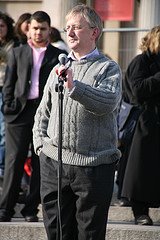Talks: Former UK Ambassador Craig Murray at the ATGWU

Craig Murray, the former UK ambassador to Uzbekistan, spoke at a meeting organised by the Irish Anti-War Movement in the ATGWU building on Middle Abbey Street in Dublin last night.
Murray, a career diplomat who had served in the British Foreign Office for twenty years, was posted to Uzbekistan in 2002, apparently on the basis that he could speak Polish, which was so close to the Russian spoken by the Uzbekis that he would be able to manage. This seems wholly unlikely but Murray was highlighting in a comic way the level of ignorance in the Foreign Office about the country. At the time of his appointment, Uzbekistan was a close ally of the US, who had an air base there. It was part of what Secretary of Defence Donald Rumsfeld described as the lily pad doctrine, which entailed the US having small air bases dotted all over Central Asian republics that could be quickly expanded in the event of a war from a standing level of 2000 soldiers to 40,000 within a month. Murray said that US sought to have bases all the way from Cyprus, where the British have a presence, to eastern Uzbekistan and believes that the intention is to control the supply of the massive oil and gas reserves in the region.
Soon after arriving to what was his first ambassadorial position, Murray decided to attend the trial of a 'dissident' charged with links to Al-Qaida and with the murder of a policeman, an offence for which the court had already convicted a number of people. The manner in which the trial was conducted - the absence of any fair procedures with an overtly anti-Islamic judge presiding - deeply worried Murray.
As he pointed out in his talk, Uzbekistan is run by dictator Islom Karimov whose totalitarian government incarcerates thousands of political prisoners and forces many of its people to work as virtual slaves in state cotton farms, earning around $2 a month. There is no freedom of speech, assembly, media or an opposition. Uzbekistan happens to be the second largest exporter of cotton in the world and much of the clothing Irish people wear is likely to include cotton picked by Uzbek slave workers.
Because of his presence at the trial, people started coming to Murray with stories of torture, some of which he described in gruesome detail. He decided to raise the issue with the Foreign Office but was told not to be 'over-focussed' on human rights. He later met representatives of the Foreign Office in 2003 and was told that information from tortured terrorist suspects was legal if the British did not actually torture and did not specifically request a particular person be tortured. Such information could be 'operationally useful'. In other words, Murray said, it didn't matter whether it was true as long as it could further the foreign policy of the goverment, which was always driven by commercial interests.
Because of his opposition to the Karimov regime, Murray resigned in 2004 and has since become an active campaigner against Western policy in the region and the 'war on terror' in general. Murray was highly sceptical about the heathrow plot uncovered in August and was critical of what he thinks is a rising tide of Islamophobia in Britain, witnessed by the near hysterical coverage of Muslim people in the press and the unnecessary coverage given to Jack Straw's ideas about how Muslim women should dress in his constituency office.
Interestingly, the US no longer has an air base in Uzbekistan with the country recently signing a deal with Russian energy giant Gazprom for access to its gas fields, which may reveal something about how politics is going in the region as Russia seeks to gain further control of energy supply.
Murray is speaking again tonight at a debate in Trinity College.
Labels: Craig Murray, Politics, Talks, Uzbekistan, War on Terror


0 Comments:
Post a Comment
<< Home